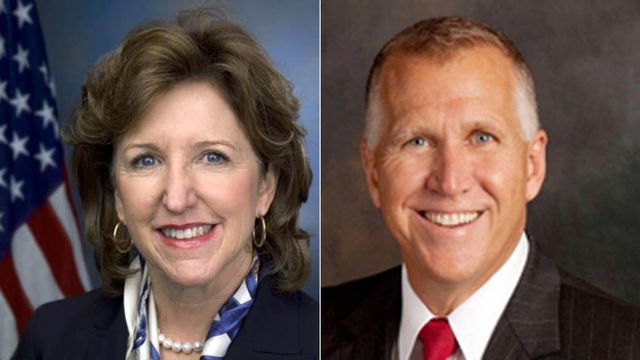WRAL News poll: Senate race remains toss-up as election nears
Democratic U.S. Sen. Kay Hagan holds a narrow lead over Republican challenger Thom Tillis with only two weeks left until the Nov. 4 election, according to a WRAL News poll released Tuesday.
Posted — UpdatedSurveyUSA polled 568 likely voters across North Carolina between last Thursday and Monday and found that, if the election were held now, Hagan would capture 46 percent of the vote, compared with 43 percent for Tillis. Libertarian candidate Sean Haugh was favored by 6 percent of respondents, while 5 percent remain undecided.
The poll has a margin of error of plus or minus 4.2 percentage points.
Hagan, who is seeking a second six-year term, holds an 11-point lead over Tillis among female voters and a 14-point lead among voters ages 18 to 34. Tillis, the speaker of the North Carolina House of Representatives, holds an 8-point edge among voters ages 65 and older and a 17-point lead among white voters, who compose the bulk of those surveyed.
Tillis is favored among voters most concerned about the economy and U.S. foreign policy, while Hagan holds the edge among those who name either education or health care as their top priority in the race.
Overall, however, neither candidate is very popular.
Hagan has a 38 percent approval rating among 691 registered voters surveyed, slightly better than her 34 percent approval rating in a WRAL News poll conducted in March. Fifty-one percent of those surveyed in the latest poll dislike the job Hagan has done in Washington, D.C., compared with 54 percent in March. Her ratings were underwater across all age, geographic, race and gender breakdowns of voters, aside from blacks, moderates and those who rank education as their main issue in the Senate race.
Meanwhile, Tillis has a 36 percent approval rating, with 51 percent saying they dislike the job he has done in charge of the state House. His ratings were underwater across all breakdowns of voters, except for those who rate the economy or foreign policy as their primary concern in the race.
SurveyUSA didn't ask voters about their opinions of Tillis' job performance in March, when he was battling eight others in the Republican primary. Rather, the poll then asked whether people had a favorable or unfavorable opinion of him. Thirty-four percent were favorable in March, with only 11 percent unfavorable and 38 percent neutral.
The Tillis campaign has tried to tie Hagan to President Barack Obama, repeatedly stating in ads, debates and public appearances that Hagan has voted for Obama's position on issues 96 percent of the time. Obama has a 40 percent approval rating in the WRAL News poll, with 54 percent of those surveyed saying the dislike his job performance.
Likewise, Hagan has tried to use the General Assembly as an anchor for Tillis, citing changes to education spending and Medicaid that her campaign says have hurt working-class families in North Carolina. State lawmakers scored the lowest approval ratings in the WRAL News poll, at 23 percent, with 53 percent of voters disapproving of the legislature's actions.
In the WRAL News poll, 87 percent of the likely voters who selected one of the three Senate candidates said they were holding firm on their choice. Eleven percent said they might change their minds before the election, with Hagan supporters twice as likely to flip than Tillis backers.
Haugh's supporters could become a tipping point in the final results of the election. Although they are primarily unaffiliated moderates, more identify themselves as conservative and Republican than Democratic and liberal.
Related Topics
• Credits
Copyright 2024 by Capitol Broadcasting Company. All rights reserved. This material may not be published, broadcast, rewritten or redistributed.






